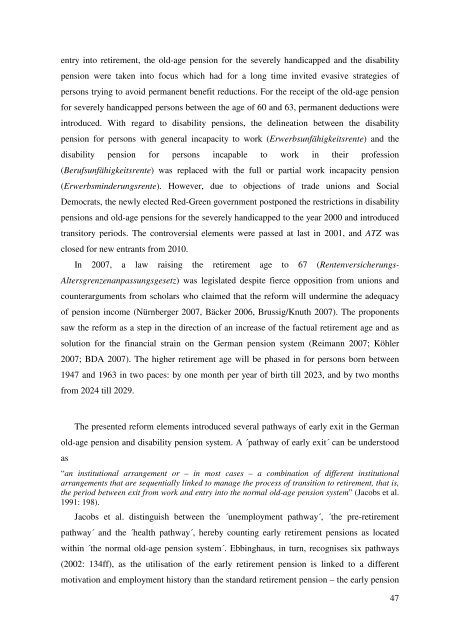Dissertation_Paula Aleksandrowicz_12 ... - Jacobs University
Dissertation_Paula Aleksandrowicz_12 ... - Jacobs University
Dissertation_Paula Aleksandrowicz_12 ... - Jacobs University
Create successful ePaper yourself
Turn your PDF publications into a flip-book with our unique Google optimized e-Paper software.
entry into retirement, the old-age pension for the severely handicapped and the disability<br />
pension were taken into focus which had for a long time invited evasive strategies of<br />
persons trying to avoid permanent benefit reductions. For the receipt of the old-age pension<br />
for severely handicapped persons between the age of 60 and 63, permanent deductions were<br />
introduced. With regard to disability pensions, the delineation between the disability<br />
pension for persons with general incapacity to work (Erwerbsunfähigkeitsrente) and the<br />
disability pension for persons incapable to work in their profession<br />
(Berufsunfähigkeitsrente) was replaced with the full or partial work incapacity pension<br />
(Erwerbsminderungsrente). However, due to objections of trade unions and Social<br />
Democrats, the newly elected Red-Green government postponed the restrictions in disability<br />
pensions and old-age pensions for the severely handicapped to the year 2000 and introduced<br />
transitory periods. The controversial elements were passed at last in 2001, and ATZ was<br />
closed for new entrants from 2010.<br />
In 2007, a law raising the retirement age to 67 (Rentenversicherungs-<br />
Altersgrenzenanpassungsgesetz) was legislated despite fierce opposition from unions and<br />
counterarguments from scholars who claimed that the reform will undermine the adequacy<br />
of pension income (Nürnberger 2007, Bäcker 2006, Brussig/Knuth 2007). The proponents<br />
saw the reform as a step in the direction of an increase of the factual retirement age and as<br />
solution for the financial strain on the German pension system (Reimann 2007; Köhler<br />
2007; BDA 2007). The higher retirement age will be phased in for persons born between<br />
1947 and 1963 in two paces: by one month per year of birth till 2023, and by two months<br />
from 2024 till 2029.<br />
The presented reform elements introduced several pathways of early exit in the German<br />
old-age pension and disability pension system. A ´pathway of early exit´ can be understood<br />
as<br />
“an institutional arrangement or – in most cases – a combination of different institutional<br />
arrangements that are sequentially linked to manage the process of transition to retirement, that is,<br />
the period between exit from work and entry into the normal old-age pension system” (<strong>Jacobs</strong> et al.<br />
1991: 198).<br />
<strong>Jacobs</strong> et al. distinguish between the ´unemployment pathway´, ´the pre-retirement<br />
pathway´ and the ´health pathway´, hereby counting early retirement pensions as located<br />
within ´the normal old-age pension system´. Ebbinghaus, in turn, recognises six pathways<br />
(2002: 134ff), as the utilisation of the early retirement pension is linked to a different<br />
motivation and employment history than the standard retirement pension – the early pension<br />
47
















